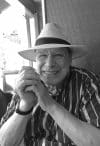
John J. Simon: Socialist Editor, Writer, and Broadcaster
Monthly Review editors remember the life of MR editorial board member John J. Simon (1934–2022), a dedicated socialist, towering figure in radical publishing and broadcasting. | more…

Monthly Review editors remember the life of MR editorial board member John J. Simon (1934–2022), a dedicated socialist, towering figure in radical publishing and broadcasting. | more…
Our senses are currently whip-driven by a feverish new pace of technological change. The activities that mark us as human, though, don’t begin, exist in, or end by such a calculus. They pulse, fade out, and pulse again in human tissue, human nerves, and in the elemental humus of memory, dreams, and art, where there are no bygone eras. They are in us, they can speak to us, they can teach us if we desire it.… In fact, for Westerners to look back on 1900 is to come full face upon ourselves in 2000, still trying to grapple with the hectic power of capitalism and technology, the displacement of the social will into the accumulation of money and things. “Thus” (Karl Marx in 1844) “all physical and intellectual senses (are) replaced by the simple alienation of all these senses, the sense of having.” We have been here all along. | more…
Paul Baran and Paul Sweezy’s voluminous correspondence in the 1950s and early 1960s ranks as one of the crucial exchanges of letters between Marxist political economists in the second half of the twentieth century, and, indeed, in the entire history of Marxist thought.… Only a few letters in their extensive correspondence have been published so far.… We have thus chosen to publish two additional letters here in recognition of the joint centennial of the births of the two Pauls: Paul Baran (1910-1964) and Paul Sweezy (1910-2004). | more…
The poet, dramatist, and politician, Aimé Césaire, who died on April 17, aged ninety-four, saw this work, indeed all his work, as a weapon, perhaps best exemplified in Une Tempète. In his introduction to it, Robin G. D. Kelley, wrote “the weapon of poetry may be Césaire’s greatest gift to a world still searching for freedom.” | more…
By the time Ernesto Che Guevara (1928–67) was executed on October 8, 1967, in La Higuera, Bolivia by soldiers under the direction of an agent of the Central Intelligence Agency, he had become a kind of ideological “fetish” for his Washington adversaries. For them Guevara was not simply some “terrorist” or “insurgent”—words used to describe him and his Cuban revolutionary comrades then, just as they are used to describe those who resist Western imperial designs today. He was something new in the context of the post-Second World War Cold War. The United States and its clients claimed they were engaged in a struggle to staunch “Soviet aggression” Moscow saw itself as engaged in a contest of competing systems: capitalism versus socialism. But from the outset of his political life, Che’s perspective was burnished in and energized by the immiseration and oppression he confronted in the “Third World.” | more…
Hans Koning died April 13 in his Connecticut home at the age of eighty-five. Monthly Review Press had the distinction of publishing three of his books. One of them, still a classic in many high schools, was Columbus: His Enterprise — Exploding the Myth, the first trade book to challenge the U.S. origin myth. That myth says that this nation was founded by brave white men fleeing oppression — not by genocide, enslaved labor, and imperialist expansion. Originally published in 1976, the U.S. Bicentennial year, it was reprinted in 1992, the five-hundredth anniversary of Columbus’s voyage, when it sold 30,000 copies. MR Press also published The Conquest of America: How the Indian Nations Lost Their Continent (1993) | more…
When my father, Paul Sweezy, died at the end of February 2004, John Kenneth Galbraith, or Ken, as he preferred to be called, in- vited my mother to gather her children and come talk. He told us that the New York Times and other newspapers had called to in- terview him for Paul ‘s obituary but he had declined. He felt bad about doing so, but he said, their questions focused on political differences and that is not what he wanted to say about Paul | more…
Notifications